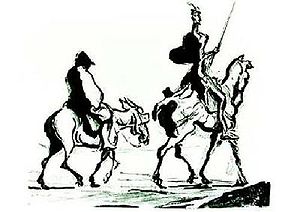These are two of my favorite aphorisms on hope. The first is from the literary critic George Steiner. The second is from the title of Studs Turkel’s book Hope Dies Last: Keeping the Faith in Difficult Times (The New Press: 2003), and is a phrase he attributes to Jessie de la Cruz, a co-worker of Cesar Chaves. I have been re-reading Terkel’s book, concurrently with Cervante’s Don Quixote Of The Mancha—Shelton’s English translation version from 1611. They go together well.
In the Introduction to Hope Dies Last, Terkel writes: “Hope has never trickled down. It has always sprung up.” He points out that positive change, transforming despair into hope, has always been a bottom up, not a top down affair and is often initiated by groups of troublemakers: activists. The rest of his book is a series of oral histories of a variety of current activists in the US. In one chapter, Linda Stout, the Executive Director of the Amherst-based Peace Development Fund is quoted saying, “Our big challenge is the people’s spirit of helplessness. Power corrupts absolutely, but so does powerlessness.”
Not to make this a Hallmark moment, but I have to bring in a very concrete source of hope I have for the future of nursing. Graduation. Yesterday I had the great honor of seeing many of my most amazing students graduate from our nursing school. I got to hood three newly minted Doctor of Nursing Practice/FNP students who I know are going on to change their parts of the world. One did his research work on both maternal survival and HIV care at the Hope Center in Nairobi, Kenya. Another did her research on cervical cancer prevention in rural Costa Rica. A third did her research on CAM/Integrative Medicine modalities in academic research medical centers in the US. Another student I was blessed to work with did her master’s research on kidney disease and kidney transplants in African-Americans. She’s now on her way to start in a terrific FNP program in the South. And the crop of new BSN students—well, hopefully you will get to read some of their essays they wrote for my health policy class in Narrative Matters sometime soon. Including an excellent essay on men in nursing by a man in nursing. There are many hidden and not-so-hidden nurse activists in the graduation class of 2011. Godspeed! And remember what Don Quixote said (OK—it was really what Peter O’Toole said in Wasserman’s screenplay The Man from La Mancha): “When life itself seems lunatic, who knows where madness lies? To surrender dreams—this may be madness; to seek treasure where there is only trash. Too much sanity may be madness! But maddest of all: to see life as it is and not as it should be.” Go change the world. And health care. And nursing.


Hello. I’d like to tell you about another whistleblower case that goes to trial in a few days, but don’t want to do it in a blog.
Anne’s comment, “I don’t think nurses understand what they could have to go through if they report—or if they know that if they report they’ll be labeled a whistleblower and probably can’t get hired again.” is very true.
Most people also assume that protection is there for anyone who needs it, not just those who can afford it. And those who can afford it will learn that the true cost turns out not to be measured in dollars.
Hi Susan,
This part of your comment I hope was OK with you for me to post. You are welcome to e-mail me if you want to discuss ‘off-line’. (is on my ‘about medical margins’ page on the blog).
Thanks for the reminder to all of us.